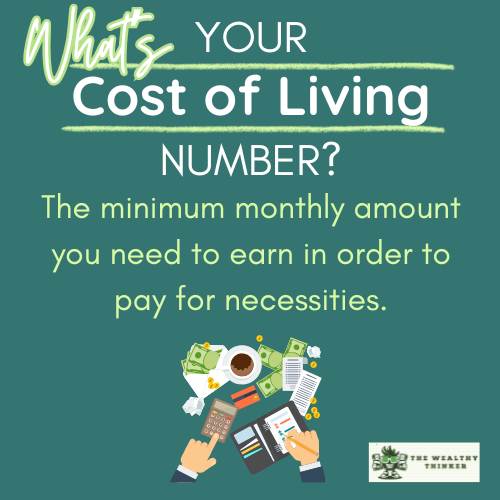Do you know how much money you need to survive for one month?
If you don’t, you’re not alone. Many people don’t know the approximate or exact amount that they need for their basic cost of living.
What’s your cost of living? It’s how much you need each month to pay for your basic needs in life.
Knowing this number is the key to:
- saving enough money for an emergency fund
- budgeting the right amount
- preparing for a worst-case scenario

What’s a Cost of Living Number & How Do You Calculate It?
A cost of living number is the monthly or yearly amount that you need to survive, the minimum you need to earn each month in order to live.
It does not include any wants in life, such as subscriptions, dining out, clothes, and so on.
To find out your cost of living number, the first thing you need to do is track your spending.
Watch where your money goes for one to three months and break down every purchase into categories.
- Mortgage
- Food
- Utilities
- Car payments
- Insurance
- Clothing
- Etc.
Once you’ve tracked your spending and know how much you dropped in every category on average for a month, you need to divide your categories into a “needs” or “wants” column.
Everything that is in the “needs” category will be added up. This is your cost of living number.
Determining “needs” versus “wants” can be very difficult.
Our lifestyle is part of our personality. We may think that going to dinner and movies every week with your friends is a need, but this is a want.
You can survive without going to the movies. You cannot survive if you don’t eat or have a place to live.
Everyone’s needs in life will be different and their cost of number will be different. For example:
- If you don’t have a car, then a car payment, gas and auto insurance will not be in your needs category, but a transit pass will.
- If you do have a car and you need to go work with that car, then your car payment and additional costs will be in your needs category.
Most people will have housing, electricity, water, food, and transportation as their needs.
The Importance of a Cost of Living Number & How to Use it
The purpose of a cost of living number is to be prepared for the worst-case scenario.
If you ever lose your job, you can cut back on your “wants” and just focus on paying for the “needs”. You’ll know exactly how much you’ll need to earn to cover your housing, transportation, food, and utilities.
It’s what you need to earn to keep the lights on at home and ensure your family has shelter and food on the table.
It’s important to only include your needs in your life for your cost of living to be able to use this number to its potential. Including wants that may seem like needs will increases how much you need each month. This makes it more difficult to save up how much you need in the case of an emergency.
Knowing your cost of living number is not just for extreme scenarios like losing your job.
Budgeting
It can also be helpful for budgeting, starting an emergency fund, and changing careers.
- For an easy budget, you can simply have your salary and subtract your cost of living number.
- The remainder is what you can spend on “wants” and savings.
If you observe your checking account every day, you will easily be able to see if you have enough money in your account to cover your bills.
Starting an Emergency Fund
Your cost of living number can also be used to help you calculate how much your emergency fund should be.
Typically an emergency fund is three to six months of expenses. Your emergency fund could be three to six months of your cost of living number. This will give you more security if you do lose your job to be able to replace it without having to worry about the necessities in life.
Changing Careers
If you lose your job, or are looking to change roles, you can use your cost of living number to calculate how much you need to earn each day.
You can find a part-time job while looking for a full-time job to replace your lost income.
Also, if you decide to go back to school to boost your chances of promotion or get into a new industry, knowing how much you need to make to cover the bills while you juggle work and education is critical.
Your Cost of Living Number: Final Thoughts
A cost of living number is the amount of money you need to survive for a month.
You can calculate it by tracking your spending and determining how much your needs actually cost per month.
It should only include the necessities in your life such as housing, transportation, utilities, and food. Everyone’s cost of living number will be different and will change as you enter different stages of your life.
It’s important to know how much you need to survive with the bare necessities each month if you lose your job. It also helps with budgeting and calculating an emergency fund.
Editor’s note: This article was originally published Jun 20, 2022 and has been updated to improve reader experience.



















